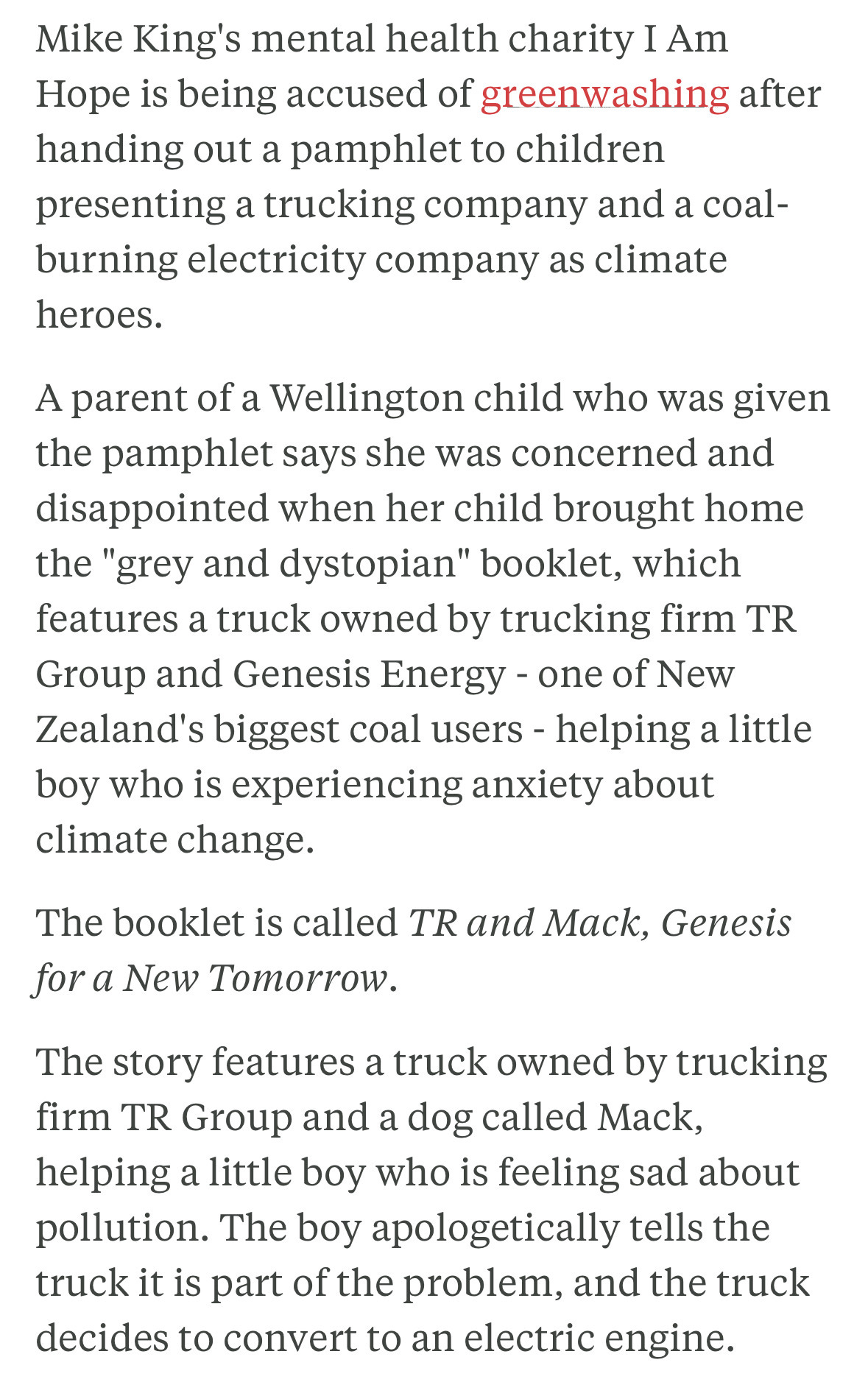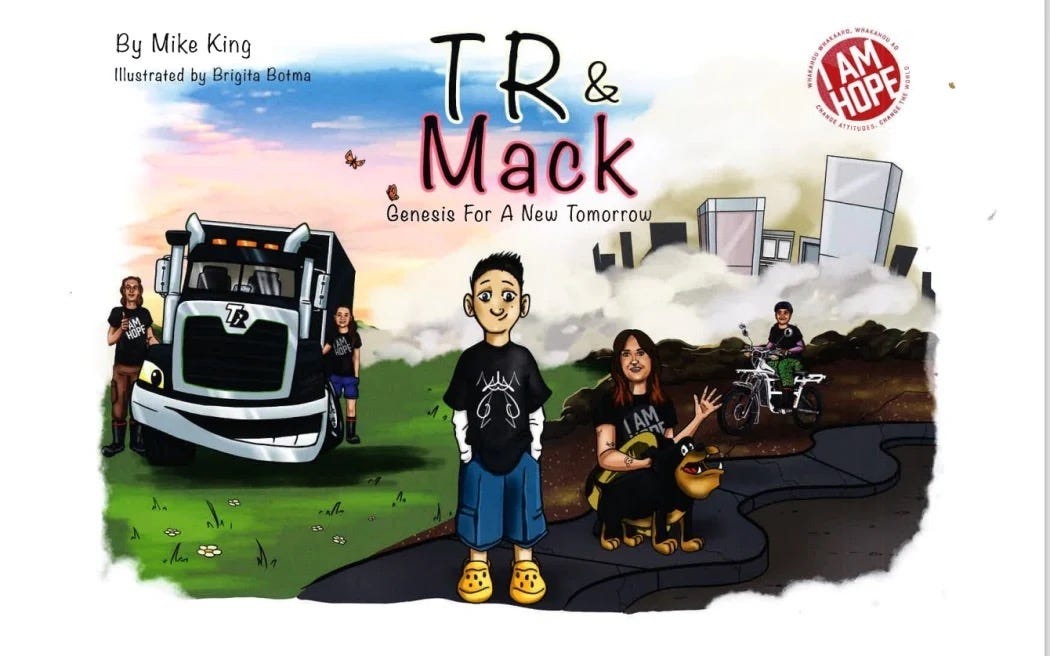I was two sentences in (and stuck on) a defence of Mike King, where I was going to highlight that he was merely the well-carved figurehead of a neoliberal-shaped problem that neither begins nor ends with him, when I stumbled across a most interesting article about corporate propaganda being disseminated through Mike King’s I Am Hope Charity, and so instead I’ll be making a quick pivot:
I no longer think it is appropriate for this man to run a counselling charity that disseminates guidance and information to our youngest and most vulnerable New Zealanders in their formative years. Let alone for him to receive the lions share of government funding to do so.
“Greenwashing” pro-corporate climate propaganda distributed to schools via I Am Hope charity
How do you address climate anxiety in children?
That’s not an easy question to answer, but it starts with not narratively glorifying the companies that are causing it. Creating a story in which energy companies are presented as the heroes of the energy crisis is not only on the nose, it alleviates climate anxiety by lying to children about climate change and the amount those companies are doing to stop it.
We could stop polluting tomorrow, if there was political will for it. We could rapidly transition away from fossil fuels, must transition more rapidly away from fossil fuels. Thats why children have “climate anxiety”: they are being presented with this poorly-filtered reality over and over again that we are destroying the environment in unknowable ways, and as they learn about the world and try to make sense of their place in it, they are repeatedly being shown that things are not fine like adults keep assuring them, and that climate change is going to destroy their futures and poses a real risk to them in a way that can’t be rationally explained away or defended from by the people they usually trust to do that.
The reason why we aren’t transitioning fast enough and why there isn’t political will within our democracy to do so is because for decades politicians and corporations have actively worked together to hide the climate crisis and their role in it, as well as to disseminate misinformation around the causes of climate change, and to sabotage efforts to move away from fossil fuels. It is beyond inappropriate for a counselling charity that has used backdoor business connections with a business-backed government to disseminate falsely reassuring information to children that explicitly absolves several top New Zealand climate polluters of their responsibility for the climate disaster our children are having brand new mental health conditions about.
Mike King is rapidly and publicly learning why neoliberalism is bad
I don’t think Mike King is a bad guy, I think he’s a guy with mental health problems who wanted to help others with mental health problems, and as a fellow sufferer, I can’t hold that against him. But he’s a business man, approaching it like a business man, one who wants to earn his fee for the work he’s putting in too, and he’s discovering at the same time as New Zealand that the funding for doing this work just isn’t there.
The cause he’s chosen to focus on specifically is “fill the massive gap that exists for children’s mental health provision”, and that’s a problem that is far bigger than one man, one charity. It’s not necessarily a space you WANT filled by one charity. And there’s already a lot of people in that space and tapping into those funding sources, especially the publicly funded ones, the sources coming from the government purse. Those are being distributed via the health system, often by small charities struggling for funding who work really hard to provide quality services to children who desperately need them, a specialised and full-time job in itself.
Mike King is playing the market, and he is a big fish in a small pond. Charities don’t put money into advertising themselves, they advertise their cause and how they help and spread their message, and if they do it well enough, they’ll have come away changing people’s minds or informing them about actual issues and solutions rather than leaving their brand in your mind. If you come away thinking of them specifically, they’re probably doing something wrong.
The “Pink Ribbon” symbol is a good example of this, as the Susan G Komen Foundation (who owns the trademark after stealing it from a woman who explicitly didn’t want corporations using her peach ribbon) has gone around suing other charities into oblivion over infringing on their iconography. This is great for the charities who benefit from this market dominance but certainly has resulted in less “good” being done from a sector simply by using market-takeover tactics to profit off its own branding at the expense of the collective cause. The charities that were actually advancing the message weren’t focussed on branding, and their tiny ships generally got sunk by the massive behemoths such aggressive growth and corporate partnership tactics were able to create.
By making himself a big player in the mental health game, Mike King has inadvertently copied this tactic of market dominance; it’s hard to be angry at his big branding and in-your-face advocacy when what he was doing was genuinely advocacy and funded was by corporate donations who wouldn’t have been adding to the pot otherwise. But Mike has bigger dreams for his charity — he wants to can go bigger, be bigger. He wants to become the biggest provider for children’s counselling, the main provider maybe — and he wants to do this at a time eyebrows are already being raised over corporate and lobbyist influence on our politicians who are forcing in an austerity budget paired with tax cuts at the expense of our health system.
When those politicians suddenly and out of the blue give him a sizeable chunk of the not-so-sizeable mental health funding that he is shrinking for others by virtue of existing, it will naturally begin raising questions neither he and the politicians have good answers for — questions like “Why was this a good use of this funding?”
A free market is a great place to be when money flows freely and survival of the fittest means that companies that are the very best at what they do get to survive. But easy and open markets made up of soft players go through booms and busts like any other market, and we are going hard into a bust cycle after a surprisingly long Labour boom, where money actually flowed into public services, and the fish that’s got the fattest from having the best branding is dominating the pond. But this is not necessarily the best charity for service provision, and the methods used to decide this are failing some serious transparency checks.
Mike King tapped into brand new revenue sources for a good cause by way of his name and personal outreach, but that method of making money has seen him sweep up more and more dollars that would have gone to other mental health initiatives. Luxon’s government knows good marketing when they see it, and they saw a way to make both parties very happy with a little under-the-table funding provisioning. But the public want more than just branding from a government who assures us they are “spending smarter”; they are not happy, and I expect that the deeper we dig into this state-sponsored counselling for schoolchildren, (already something that should be incredibly transparent due to the influence that has over an entire generation of youth) the more we’ll discover how the regulations and mechanisms of state for funding that keep the executive from operating within their own narrow parameters are there for a very good reason.
Meanwhile, I’m starting to have some serious questions over what else Mike King’s counselling charity may be teaching our children.










Massive props to the Parent for being engaged with their Childs education & being socially aware enough to pick up on the dissonant nature of these pamphlets. I've become a strong believer that change must start from the grass roots. Something as simple as a Parent reading a pamphlet brought home by their child & bringing attention to it, can have a butterfly effect. We won't see that effect immediately but something tells me to "watch this space".
There is a reason why "I am hope" is one of the few(possibly) only organizations involved in mental health that has had their funding INCREASED instead of decreased or chopped altogether. We will possibly find that out in a year or two.
Seeing 'climate anxiety' in kids, especially when promoted by major polluters, feels off. I'm also a proponent of relabelling this because "anxiety" pathologises and individualises a normal response to the legitimate crisis we’re facing. It’s not just anxiety. It’s more 'ecological grief', a sign of deep connection and love for the planet. I wrote about it quite a bit, including this piece here (https://entangledcuriosities.substack.com/p/if-ecological-grief-and-i-had-a-coffee). If Fonterra, Genesis and Z truly want to reconfigure their core mission, they should back real solutions: NOT stalling in renewable transition, encouraging farmers to seek alternate farming options away from dairy, and promoting alternatives to driving. Until then, this feels like greenwashing.